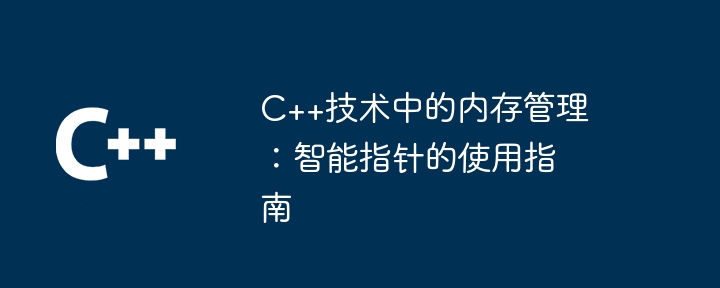Home >Backend Development >C++ >Memory management in C++ technology: A guide to using smart pointers
Memory management in C++ technology: A guide to using smart pointers
- PHPzOriginal
- 2024-05-07 11:33:011170browse
Smart pointers are used in C to implement safe memory management, thereby eliminating memory leaks and free-after-access errors. They come in two main types: std::unique_ptr for unique ownership and std::shared_ptr for shared ownership. Smart pointers automatically manage memory pointing to data and release memory that is no longer used, simplifying memory management and enhancing program robustness.

Memory Management in C Technology: A Guide to Using Smart Pointers
Introduction
Memory management is one of the common challenges in C programming. one. Improper memory management can lead to program crashes, data corruption, and security vulnerabilities. Smart pointers are a library that provides an easy-to-use and safe memory management solution.
Basics of smart pointers
Smart pointers are similar to ordinary pointers, but they automatically manage the memory pointing to the data. When a smart pointer no longer points to anything, it automatically releases the associated memory. This eliminates the need to manually manage memory, reducing the risk of memory leaks and free-after-access errors.
Types of smart pointers
The C standard library provides two main types of smart pointers:
- std::unique_ptr: applicable A uniquely owned pointer to a single object. After the pointer is released, the resource pointed to will be released.
- std::shared_ptr: Suitable for multiple pointers with shared ownership. When the ownership count of the pointed object reaches 0, the pointed resource will be released.
Practical Example
Consider the following code snippet, which shows how to use smart pointers to manage pointers to std::vector objects:
#include <vector>
#include <iostream>
#include <memory>
int main() {
// 使用 std::unique_ptr 管理唯一的对象所有权
std::unique_ptr<std::vector<int>> unique_ptr = std::make_unique<std::vector<int>>();
unique_ptr->push_back(1);
unique_ptr->push_back(2);
// 使用 std::shared_ptr 管理共享的对象所有权
std::shared_ptr<std::vector<int>> shared_ptr = std::make_shared<std::vector<int>>();
shared_ptr->push_back(3);
shared_ptr->push_back(4);
std::cout << "unique_ptr 元素:" << std::endl;
for (auto& item : *unique_ptr) {
std::cout << item << " ";
}
std::cout << std::endl;
std::cout << "shared_ptr 元素:" << std::endl;
for (auto& item : *shared_ptr) {
std::cout << item << " ";
}
std::cout << std::endl;
return 0;
} Advantages
- Eliminate memory leaks and free-after-access errors
- Improve the readability and maintainability of the code
- Enhance the robustness and security of the program Performance
Limitations
- In some cases, smart pointers can cause overhead, such as when a program uses a large number of short-lived objects that cannot be accessed directly Underlying pointer
The above is the detailed content of Memory management in C++ technology: A guide to using smart pointers. For more information, please follow other related articles on the PHP Chinese website!

